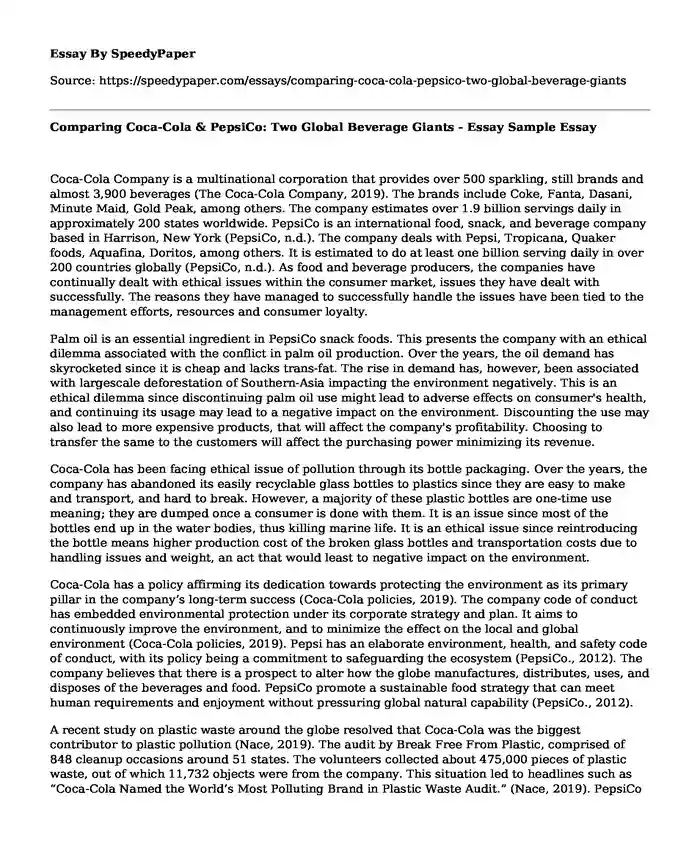Coca-Cola Company is a multinational corporation that provides over 500 sparkling, still brands and almost 3,900 beverages (The Coca-Cola Company, 2019). The brands include Coke, Fanta, Dasani, Minute Maid, Gold Peak, among others. The company estimates over 1.9 billion servings daily in approximately 200 states worldwide. PepsiCo is an international food, snack, and beverage company based in Harrison, New York (PepsiCo, n.d.). The company deals with Pepsi, Tropicana, Quaker foods, Aquafina, Doritos, among others. It is estimated to do at least one billion serving daily in over 200 countries globally (PepsiCo, n.d.). As food and beverage producers, the companies have continually dealt with ethical issues within the consumer market, issues they have dealt with successfully. The reasons they have managed to successfully handle the issues have been tied to the management efforts, resources and consumer loyalty.
Palm oil is an essential ingredient in PepsiCo snack foods. This presents the company with an ethical dilemma associated with the conflict in palm oil production. Over the years, the oil demand has skyrocketed since it is cheap and lacks trans-fat. The rise in demand has, however, been associated with largescale deforestation of Southern-Asia impacting the environment negatively. This is an ethical dilemma since discontinuing palm oil use might lead to adverse effects on consumer's health, and continuing its usage may lead to a negative impact on the environment. Discounting the use may also lead to more expensive products, that will affect the company's profitability. Choosing to transfer the same to the customers will affect the purchasing power minimizing its revenue.
Coca-Cola has been facing ethical issue of pollution through its bottle packaging. Over the years, the company has abandoned its easily recyclable glass bottles to plastics since they are easy to make and transport, and hard to break. However, a majority of these plastic bottles are one-time use meaning; they are dumped once a consumer is done with them. It is an issue since most of the bottles end up in the water bodies, thus killing marine life. It is an ethical issue since reintroducing the bottle means higher production cost of the broken glass bottles and transportation costs due to handling issues and weight, an act that would least to negative impact on the environment.
Coca-Cola has a policy affirming its dedication towards protecting the environment as its primary pillar in the company’s long-term success (Coca-Cola policies, 2019). The company code of conduct has embedded environmental protection under its corporate strategy and plan. It aims to continuously improve the environment, and to minimize the effect on the local and global environment (Coca-Cola policies, 2019). Pepsi has an elaborate environment, health, and safety code of conduct, with its policy being a commitment to safeguarding the ecosystem (PepsiCo., 2012). The company believes that there is a prospect to alter how the globe manufactures, distributes, uses, and disposes of the beverages and food. PepsiCo promote a sustainable food strategy that can meet human requirements and enjoyment without pressuring global natural capability (PepsiCo., 2012).
A recent study on plastic waste around the globe resolved that Coca-Cola was the biggest contributor to plastic pollution (Nace, 2019). The audit by Break Free From Plastic, comprised of 848 cleanup occasions around 51 states. The volunteers collected about 475,000 pieces of plastic waste, out of which 11,732 objects were from the company. This situation led to headlines such as “Coca-Cola Named the World’s Most Polluting Brand in Plastic Waste Audit.” (Nace, 2019). PepsiCo has also received backlash on their use of palm oil as a direct cause of South-Asian deforestation. This is because the company is the largest buyer of the palm-oil from the region, making the company associated with environmental degradation, pollution, and global warming emission.
In response to the ethical issues, some of the Coca-Cola outlets are encouraging a 100 percent recycled-PET through their branding. In Sweden, all the new labels have been designed to encourage the clients to recycle more, thus aligning with the company's call for environmental protection (Barrett, 2020). The tags communicate, "Recycle me again. I am made of 100% recycled plastic,” a move that can be effected by other managers globally, thus reducing the waste (Barrett, 2020). Pepsi has also restructured its palm oil strategy by requiring all its suppliers, both direct and indirect, to commit to terminating deforestation with “No Deforestation, No Peat, No Exploitation,” (Jong’, 2020). Further, the company has committed to only buy from sustainable sources without the creation of high carbon stock (HCS) vegetation, or high conservation value (HCV) region, and no new alteration of the peatlands (Jong’, 2020).
Reference
Barrett, A. (2020, February 10). New Coke Labels to Promote Recycling. Bioplastics News. https://bioplasticsnews.com/2020/02/10/coca-cola-labels-promote-recycling/#:~:text=New%20labels%20on%20Coca-Cola%27s
Coca-Cola policies. (2019). Occupational Health & Safety Policy. https://coca-colahellenic.com/media/3642/occupational-health-safety-policy-march-2019.pdf
Jong’, N., H. (2020, March 11). PepsiCo renews sustainable palm oil policy to close supplier loophole. Mongabay Environmental News. https://news.mongabay.com/2020/03/pepsico-palm-oil-sustainable-indonesia-indofood-deforestation-sumatra/
Nace, T. (2019, October). Coca-Cola Named the World’s Most Polluting Brand in Plastic Waste Audit. Forbes. https://www.forbes.com/sites/trevornace/2019/10/29/coca-cola-named-the-worlds-most-polluting-brand-in-plastic-waste-audit/#6bbe9ef674e0
PepsiCo, Inc. (n.d.) PepsiCo, Inc. Official Website. About the Company. https://www.pepsico.com/about/about-the-company
PepsiCo. (2012). PepsiCo, Inc. Official Website. Global Code of Conduct. https://www.pepsico.com/about/global-code-of-conduct
The Coca-Cola Company. (2019). Coca-Colacompany.Com. Brands & Products https://www.coca-colacompany.com/brands
Cite this page
Comparing Coca-Cola & PepsiCo: Two Global Beverage Giants - Essay Sample. (2023, Oct 27). Retrieved from https://speedypaper.com/essays/comparing-coca-cola-pepsico-two-global-beverage-giants
Request Removal
If you are the original author of this essay and no longer wish to have it published on the SpeedyPaper website, please click below to request its removal:
- International Business Essay Example
- Service Quality and Customer Satisfaction in Banking - Free Paper with Annotated Bibliography
- Paper Example on Comparing Impact of Laws on Tesco Plc's Customer Service
- Paper Sample on Service Philosophy
- Free Essay. Dunkin' Donuts Company: History and Introduction
- Essay Sample: Effects of Reliance on Social Media for News and Information on the Consumers' Perspective
- Paper Example. Nestle Company International Accounting/Industry and Organization.
Popular categories





